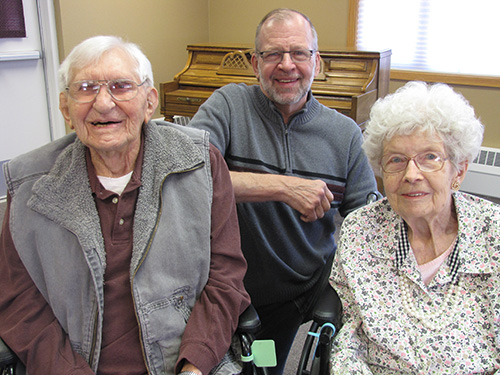Farmers Union Insurance Agent & 101-Year-Old Lifetime Member Share Their Story
A third-generation farmer married to a third-generation farmer, Verna understood the impact insurance made to a farm’s bottom line. “I was so glad when we were able to sell multi-peril crop insurance. If someone had a perfect looking crop that got hailed on and then dried out the farmer got a double-whammy. It was nice to be able to help them out.”
Today, at 95, Verna sits in the community room of Good Samaritan Center in Canton with her husband of 74 years, Julian, 101. Together, they reflect on their family’s farm and involvement in S.D. Farmers Union.
“I joined the Farmers Union right after school because there was a huge cry in the Farmers Union for parity farmers were not getting a fair share.
Parity meant we would get an income comparable to others in society,” Julian explains.
Julian’s dad, Thorsten, was already an officer when Julian was elected to serve as secretary/treasurer of Canton Local 738 in 1937. Life on their family farm had been tough in recent years.
As Julian explains, it all began when his dad took over his uncle’s farm payment in 1928. “My uncle left his quarter of land to join the Mormons in Salt Lake City. The banker came out and asked my dad if he would take over the $14,000 mortgage on the land which was just west of us. Dad thought about it. He had just paid off the mortgage on our homestead in 1926. Then the hard times came.”
The family and their farms survived the Dirty Thirties. Years later, Julian and his brother, Laurel, were able to pay off the uncle’s mortgage.
Holter Family Farm 1868-2016
Verna and Julian grew up as neighbors. Both families homesteaded in Lincoln County. The farm they lived on together, after marrying in 1942, was homesteaded by Julian’s grandpa, Jacob.
An iron miner in Duluth, Minn., Jacob and a friend were intrigued by rumors of gold in Montana, so they hopped on a train to see for themselves. When the track ran out at Sioux City, the friends decided to check out homesteading opportunities in Dakota Territory.
“Jacob came up over the hills from the south and looked out over the Big Sioux Valley and he said, ‘isn’t that a grand valley.’ The grass was waist high for as far as you could see. There were no buildings or farms or towns,'” retells Julian.
By the time Verna began selling insurance, hundreds of small farms dotted the Lincoln County countryside. Her business grew. By retirement, she had two offices one in Canton and one in Beresford.
“I enjoyed the freedom of being able to set my own schedule and the people of course. I worked with great people,” Verna says of her clients.
As an insurance agent, her time wasn’t always her own, her son, Jerry interjects.
“Whenever a client would have a claim, mom would always go out with the adjuster to make sure her client was taken care of.” Jerry recalls several phone calls which Verna responded to day or night even on Christmas Day.
Verna had built up quite a business by the time she and Julian adopted baby Jerry, welcoming him into their lives and the Holter farmstead.
It was 1952, and although it was unique to the time, Verna kept working even though she had a new baby to care for. “I was thinking about quitting and the Regional Manager said I couldn’t quit now because they had invested so much training into me,” Verna explains. “It was interesting work, but it took more than part-time to keep up. There was a lot of training involved.”
Childcare was never an issue.
About the time Jerry arrived, Julian’s mom, Inga “Olson,” had welcomed her four, now widowed and bachelor siblings to join her on the farm. They built a small house and moved some trailer houses onto the farmstead next door to Julian and Verna.
“For a time, neighbors called our farm “Olsonville,'” says Jerry, explaining his morning routine as a toddler. “I would eat breakfast with my parents, then walk to Grandma Inga then across to Aunt Helen’s for a snack, then over to my great uncles’ Eilert and Boye’s trailer for rolled pancakes with butter and sugar, and then, I made my last stop at Uncle Lauritz, who kept a drawer filled with candy by the couch. He would give me some candy and lukewarm coffee.”
After breakfast, Jerry would often join Julian in the fields. When it came to Farmers Union activities, Jerry would also tag along.
His parents were active at the local and state level. A 1970 Torchbearer, Jerry remembers attending several local, district and state conventions where Julian was often called on to lead the singing.
“I have sung all my life,” says Julian, who was asked to travel to Norway to sing on Pentecost as part of a Norwegian men’s singing group.
Julian continues to sing with the Grieg Male Chorus, who these days, gathers at the Good Samaritan Center for practice.

Listen to Julian sing “God Bless America” {WIDGET}11{/WIDGET}
Healthy until summer 2016, the Holters were able to continue farming their family’s land, with Jerry’s help. Jerry owns the neighboring farm. Shortly after Memorial Day, an infection left Julian without the use of his left leg. This led the couple to sell their farm and move into the Good Samaritan Center in Canton.
“Change is something we all need to be prepared for,” Julian says.
He doesn’t complain. Instead, he references back to the days when he and his brother transitioned away from work horses and purchased the farm’s first tractor, a 1937 Allis Chalmers. “My uncle, who ranched near Hayes, wrote my dad, “don’t sell the horses boys. Those tractors are just a fad.'”

